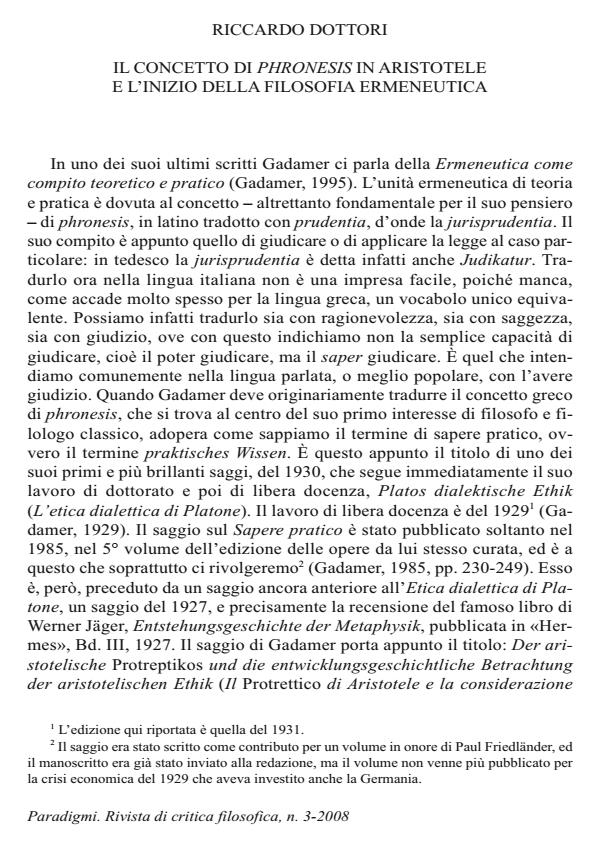Il concetto di phronesis in Aristotele e l'inizio della filosofia ermeneutica
Titolo Rivista PARADIGMI
Autori/Curatori Riccardo Dottori
Anno di pubblicazione 2009 Fascicolo 2008/3
Lingua Italiano Numero pagine 14 P. 53-66 Dimensione file 76 KB
DOI
Il DOI è il codice a barre della proprietà intellettuale: per saperne di più
clicca qui
Qui sotto puoi vedere in anteprima la prima pagina di questo articolo.
Se questo articolo ti interessa, lo puoi acquistare (e scaricare in formato pdf) seguendo le facili indicazioni per acquistare il download credit. Acquista Download Credits per scaricare questo Articolo in formato PDF

FrancoAngeli è membro della Publishers International Linking Association, Inc (PILA)associazione indipendente e non profit per facilitare (attraverso i servizi tecnologici implementati da CrossRef.org) l’accesso degli studiosi ai contenuti digitali nelle pubblicazioni professionali e scientifiche
The Aristotelian concept of phronesis and the beginning of hermeneutical philosophy - This essay outlines Gadamer’s interpretation of the different meanings which the concept of phronesis assumes in Aristotle’s works, Protrepticus, Ethica Eudemia and Ethica Nicomachea. Gadamer shows that phronesis could mean both theoretical and practical knowledge in everyday life and ordinary language, but only in Aristotle’s Ethica Nicomachea it acquires a specific meaning, different from the proper knowledge of techne and the universal knowledge, typical of sophia. Technical knowledge can be objectively learnt and taught, while phronesis cannot be acquired or borrowed from others, because it concerns our own existence. Phronesis is also different from theoretical knowledge, because it is a concrete way of behaving in a single, unrepeatable situation, where virtue becomes real against the background of a universal norm. In Gadamer’s perspective, phronesis is the key to understand hermeneutics, because of its fundamental character of historicity. Hermeneutics is a practice, more than a technique, because it is not a mere application of language rules, but the understanding of what the other wants to tell us in communicative encounter. Christoph Jamme, The double message: the real Liebenkönnen and the Sterbenmüssen.
Riccardo Dottori, Il concetto di phronesis in Aristotele e l'inizio della filosofia ermeneutica in "PARADIGMI" 3/2008, pp 53-66, DOI: